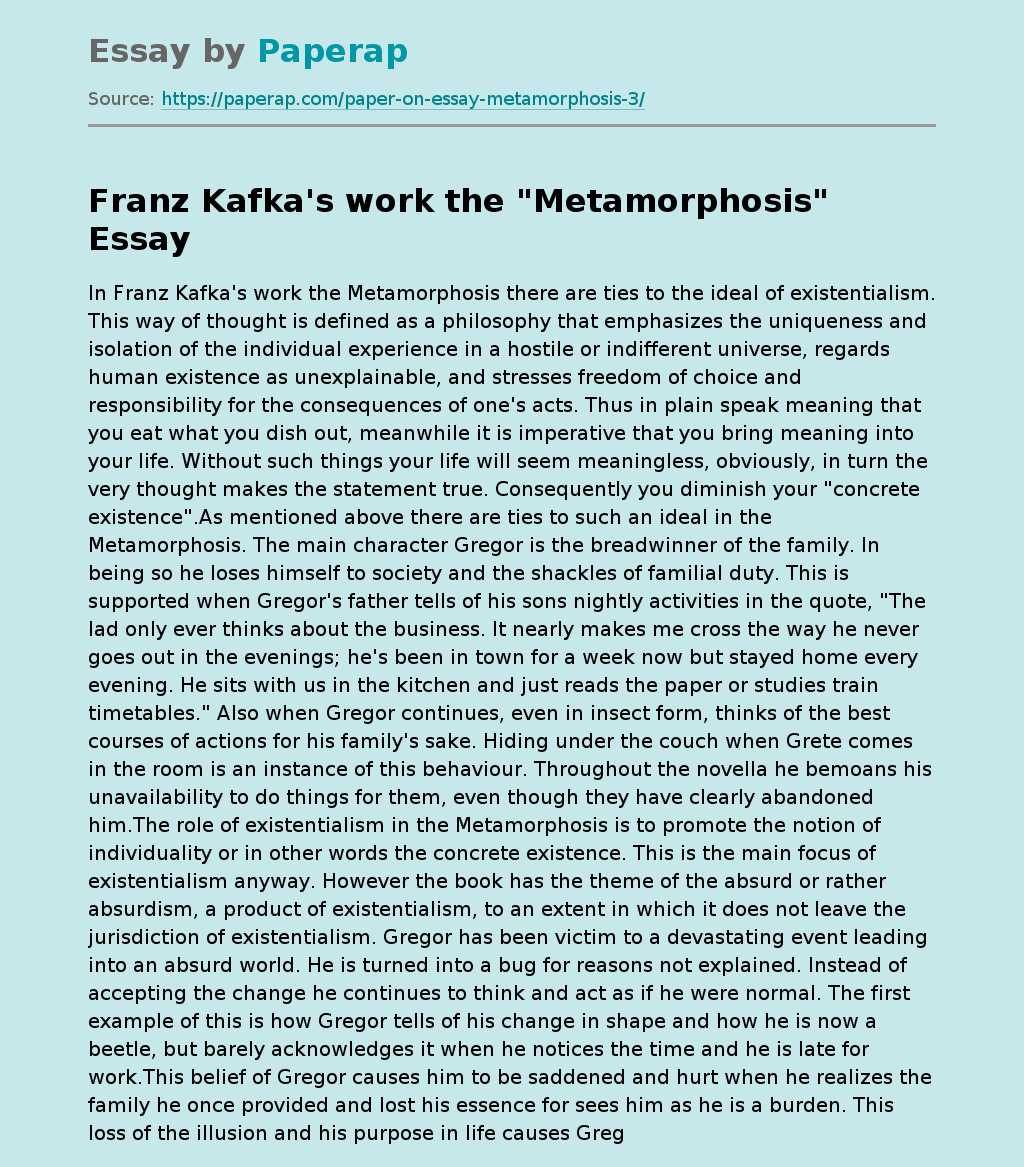Franz Kafka's "Metamorphosis"
In Franz Kafka’s work the Metamorphosis there are ties to the ideal of existentialism. This way of thought is defined as a philosophy that emphasizes the uniqueness and isolation of the individual experience in a hostile or indifferent universe, regards human existence as unexplainable, and stresses freedom of choice and responsibility for the consequences of one’s acts. Thus in plain speak meaning that you eat what you dish out, meanwhile it is imperative that you bring meaning into your life.
Without such things your life will seem meaningless, obviously, in turn the very thought makes the statement true.
Consequently you diminish your “concrete existence”.As mentioned above there are ties to such an ideal in the Metamorphosis. The main character Gregor is the breadwinner of the family. In being so he loses himself to society and the shackles of familial duty. This is supported when Gregor’s father tells of his sons nightly activities in the quote, “The lad only ever thinks about the business.
It nearly makes me cross the way he never goes out in the evenings; he’s been in town for a week now but stayed home every evening. He sits with us in the kitchen and just reads the paper or studies train timetables.” Also when Gregor continues, even in insect form, thinks of the best courses of actions for his family’s sake. Hiding under the couch when Grete comes in the room is an instance of this behaviour.
Throughout the novella he bemoans his unavailability to do things for them, even though they have clearly abandoned him.
The role of existentialism in the Metamorphosis is to promote the notion of individuality or in other words the concrete existence. This is the main focus of existentialism anyway. However the book has the theme of the absurd or rather absurdism, a product of existentialism, to an extent in which it does not leave the jurisdiction of existentialism. Gregor has been victim to a devastating event leading into an absurd world. He is turned into a bug for reasons not explained. Instead of accepting the change he continues to think and act as if he were normal. The first example of this is how Gregor tells of his change in shape and how he is now a beetle, but barely acknowledges it when he notices the time and he is late for work.This belief of Gregor causes him to be saddened and hurt when he realizes the family he once provided and lost his essence for sees him as he is a burden. This loss of the illusion and his purpose in life causes Gregor ask “What now, then?” By doing such a thing he questions his whole existence and purpose as to why he is. If he would have been able to continue in this way he might have found an adequate answer.
Nevertheless he ends up dying due to the lack of eating he had recently been doing. His death reconfirms that cost of one’s actions.The repetitive showings of Gregors failure at individuality furthermore chips away at a possibility of Gregor forming something to resemble a “concrete” existence. His broken bond with family tears it to shreds. He has no more reason to hold on to life, a life he has no purpose in. The unfortunate character Gregor due to his own choice is alienated from society and family and remains that way in his final moments. The fact that his peace of mind during his last breaths might have been due to his acceptance of his experiences remains to be interpreted by the reader.
Franz Kafka's "Metamorphosis". (2019, Jun 20). Retrieved from https://paperap.com/paper-on-essay-metamorphosis-3/

